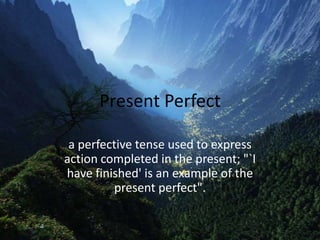Present perfect
•Download as PPTX, PDF•
0 likes•60 views
The present perfect tense is used to express an action that is completed in the present. It is formed using "have" or "has" plus the past participle of the main verb. For regular verbs, the past participle is formed by adding "-ed" to the base verb. The negative form uses "have/has" plus "not" plus the past participle. The question form uses "have/has" plus "been" plus the present participle.
Report
Share
Report
Share

Recommended
More Related Content
What's hot
What's hot (20)
Viewers also liked
Viewers also liked (7)
PCC#105 PT2. SOCIAL IMPACT: How do you know your company's investment in soci...

PCC#105 PT2. SOCIAL IMPACT: How do you know your company's investment in soci...
Present perfect
- 1. Present Perfect a perfective tense used to express action completed in the present; "`I have finished' is an example of the present perfect".
- 2. Present Perfect +Positive form • S + 'have' / 'has' + the past participle • Make the past participle by adding 'ed' to regular verbs (for example, ‘laugh' becomes ‘laughed') • There are a few verbs that change their spelling when you add 'ed' (for example, 'study' becomes 'studied‘ ‘eat’ becomes ‘eaten’)
- 3. Present Perfect – Negative Form •S + have or has + not + past participle • Example: I have not traveled
- 4. Present Perfect ? Question Form S + has/have + been + present participle • Ex: Have you been waiting long?